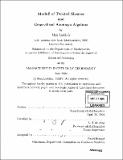| dc.contributor.advisor | A. J. de Jong. | en_US |
| dc.contributor.author | Lieblich, Max, 1978- | en_US |
| dc.contributor.other | Massachusetts Institute of Technology. Dept. of Mathematics. | en_US |
| dc.date.accessioned | 2006-03-24T18:23:42Z | |
| dc.date.available | 2006-03-24T18:23:42Z | |
| dc.date.copyright | 2004 | en_US |
| dc.date.issued | 2004 | en_US |
| dc.identifier.uri | http://hdl.handle.net/1721.1/30145 | |
| dc.description | Thesis (Ph. D.)--Massachusetts Institute of Technology, Dept. of Mathematics, 2004. | en_US |
| dc.description | Includes bibliographical references (p. 151-156). | en_US |
| dc.description.abstract | We construct and describe compactified moduli stacks of Azumaya algebras on a smooth projective morphism X [right arrow] S. These stacks are the algebro-geometric version of the (suitably compactified) stacks of principal PGLn-bundles and they also have strong connections to arithmetic. A geometric approach to the problem leads one to study stacks of (semistable) twisted sheaves. We show that these stacks are very similar to the stacks of semistable sheaves. This gives a way of understanding the structure of the stack of principal PGLn-bundles and its coarse moduli space in terms of fairly well-understood spaces. In particular, when X [right arrow] S is a smooth projective curve or surface over an algebraically closed field, our method yields concrete theorems about the structure of these stacks (at least as certain natural invariants are allowed to increase without bound). On the arithmetic side, we use the geometry and rationality properties of these moduli spaces to study a classical question about the Brauer group of a function field K, known as the "period-index problem": for which classes o in Br(K) of order n does there exist a division algebra D of rank n2 with [D] = [alpha]? We give an answer to this question when K is the function field of a curve or surface over an algebraically closed, finite, or local field and when c is an unramified Brauer class of order prime to the characteristic of K. In the general case, we relate the unramified period-index problem to rationality questions on Galois twists of moduli spaces of semistable sheaves. | en_US |
| dc.description.statementofresponsibility | by Max Lieblich. | en_US |
| dc.format.extent | 156 p. | en_US |
| dc.format.extent | 8795478 bytes | |
| dc.format.extent | 8795287 bytes | |
| dc.format.mimetype | application/pdf | |
| dc.format.mimetype | application/pdf | |
| dc.language.iso | eng | en_US |
| dc.publisher | Massachusetts Institute of Technology | en_US |
| dc.rights | M.I.T. theses are protected by copyright. They may be viewed from this source for any purpose, but reproduction or distribution in any format is prohibited without written permission. See provided URL for inquiries about permission. | en_US |
| dc.rights.uri | http://dspace.mit.edu/handle/1721.1/7582 | |
| dc.subject | Mathematics. | en_US |
| dc.title | Moduli of twisted sheaves and generalized Azumaya algebras | en_US |
| dc.type | Thesis | en_US |
| dc.description.degree | Ph.D. | en_US |
| dc.contributor.department | Massachusetts Institute of Technology. Department of Mathematics | |
| dc.identifier.oclc | 56018090 | en_US |
